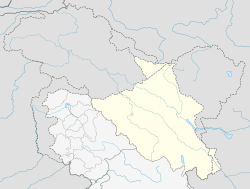Hanu, Ladakh
Hanu | |
|---|---|
Village | |
Location in Ladakh, India | |
| Coordinates: 34°35′28″N 76°37′23″E / 34.591°N 76.623°E | |
| Country | |
| Union Territory | |
| District | Leh |
| Tehsil | Khalsi |
| Panchayat | Hanu |
| Population (2011) | |
• Total | 1,207 |
| Time zone | UTC+5:30 (IST) |
| Census code | 940 |
Hanu (also called Hanoo) is a village panchayat in the Khalsi tehsil in the Leh district of Ladakh, India.[1] It is one of the main Brokpa villages in Ladakh. It is in the valley of the Hanu stream that flows from the Chorbat La pass to drain into the Indus river.
Geography
Hanu consists of two villages — Yogma Hanu (Lower Hanu) and Goma Hanu (Upper Hanu) — which lie in the eponymous valley, running between the Chorbat La pass and the Indus River valley near Dah. The Hanu stream flows down the valley and joins the Indus. To the north of the Chorbat La pass, the Chorbat Lungpa river flows north to join the Shyok river near Hassanabad Chorbat.
History
The Chorbat La pass is considered the traditional boundary between Baltistan and Ladakh. According to geographer Frederick Drew, the valleys of Chorbat Lungpa and Hanu constituted the main route from Baltistan to Ladakh in the past. The two villages Goma Hanu and Yogma Hanu are fortified, indicating that they experienced raids from Baltistan in the past.[2]
Demographics
According to the 2011 census of India, Hanoo has a population of 1207 across 224 households. The literacy rate is 47.69%.[3]
See also
References
- ^ "Blockwise Village Amenity Directory" (PDF). Ladakh Autonomous Hill Development Council 2014–15. Archived from the original (PDF) on 3 April 2018.
- ^ Drew, The Jummoo and Kashmir Territories (1875), pp. 263–264: "The Chorbat Pass is the boundary of Baltistan in this direction; by this road also used to come Balti raiders, as the remains of a fort at Yogma Hanū prove, which the people of the valley had put up against them."
- ^ "Leh district census". 2011 Census of India. Directorate of Census Operations. Retrieved 23 July 2015.
- Sources
- Drew, Frederic (1875), The Jummoo and Kashmir Territories: A Geographical Account, E. Stanford – via archive.org
